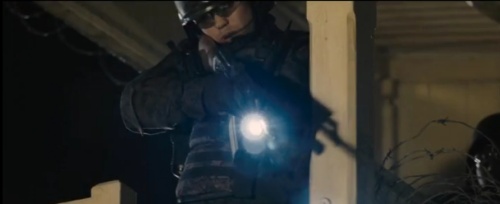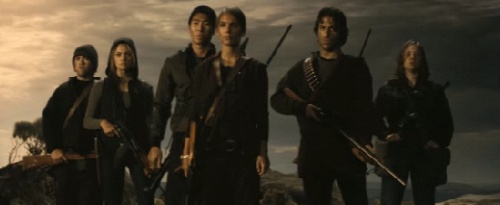Tomorrow, When the War Began (Stuart Beattie, 2010)
Stuart Beattie’s adaptation of John Marsden’s Tomorrow, When the War Began, about a group of teenagers dealing with an invasion of Australia, lets us see two interesting examples of Australian nationalism at work.
The first is a strange, misguided pride in local product. Beattie’s film has been greeted with generally kind reviews from local critics, and it seems Australians have been indulgent of a film that dares to do what Hollywood movies routinely do but Australian films generally don’t. This isn’t about a father and a son reuniting on a road trip through the outback, or a family confronting secrets about their past while out on a farm in the outback, or an examination of the travails of indigenous Australians in remote communities in the outback. This is about a war! And explosions! And there are fighter planes and stuff! And we made it, and it mostly doesn’t look fake!
Well, bravo. But there was a time when we could produce action films that beat Hollywood at their own game (obviously I mean the first two Mad Max films), so I can’t get too excited about this. If we were confronted with an American film with these production values and action sequences we’d peg it instantly for exactly what it is: a run-of-the-mill, low-to-mid-range action film. Beattie’s staging of action scenes is competent, but also singularly undistinguished. The film is also full of generic suspense moments of the “bad guy creeps up behind good guy and surprises them, only for the good guy to punch them / run away quick enough that it didn’t matter that the bad guy had the drop on them” variety. You can only pull that cop-out once: after that every moment that you have a bad guy sneak up on a hero doesn’t matter.
This wouldn’t be such an issue if the film were the interesting portrayal of teens under pressure that it wants to be, but it’s consistently clunky in its character development. The young cast try hard, but a mix of their own inexperience and the script’s broad delineation of the characters brings them undone. We have a series of widely divergent types in our ragtag group, and I can sort of accept that in a small country town these kids might hang out together, but the interplay between them feels forced and the types are too familiar. In addition to our plucky heroine, her loyal best friend, and the enigmatic romantic interest, we have the cowardly jock who comes through in the end, the overly earnest Christian girl who comes through in the end, the goofy comic Greek guy who comes through in the end, the pampered princess who comes through in the end, and the generic stoner guy who comes through in the end… Everyone is defined by one trait that they overcome at film’s conclusion. Sometimes this growth occurs simply because it’s the point in the plot where it needs to happen – the stoner seems to be in the film simply to plausibly provide a cigarette lighter at a key moment – but at other times it’s awkwardly handled in expository dialogue and speeches. So, for example, in one quiet moment after the heat of battle the heroine looks to the goofy comic Greek guy and declares: “You’re changing.” It’s never a good sign when the dialogue consists of an explicit, one sentence précis of the narrative point of the scene. She might as well say: “You have a clearly defined character arc along which you have been effectively progressed by the plot.”
 A willingness to forgive a local film its clunkiness is harmless enough, at least. The second, scarier Australian nationalism on evidence here is the inevitable subtext of a film about Australia getting invaded by its Asian neighbours. I’m obviously not the first to raise this (see Thomas Caldwell’s review, for example, and I’m aware there have always been mutterings about the subject in discussions of Marsden’s books) but it’s surprising how many people are arguing that this is no big deal. Well, sorry, it is. This is a mainstream Australian film that treats the premise that Australia could be invaded by a coalition of Asian countries seriously. That’s weird and we need to talk about it.
A willingness to forgive a local film its clunkiness is harmless enough, at least. The second, scarier Australian nationalism on evidence here is the inevitable subtext of a film about Australia getting invaded by its Asian neighbours. I’m obviously not the first to raise this (see Thomas Caldwell’s review, for example, and I’m aware there have always been mutterings about the subject in discussions of Marsden’s books) but it’s surprising how many people are arguing that this is no big deal. Well, sorry, it is. This is a mainstream Australian film that treats the premise that Australia could be invaded by a coalition of Asian countries seriously. That’s weird and we need to talk about it.
Let me say at the outset I don’t think either Marsden or Beattie are racists or ultra-nationalist conspiracy theorists. I haven’t read the books but I gather Marsden’s interest was in the way sheltered Australian teenagers who have never had to fight for anything might react to true adversity. That’s a legitimately interesting subject. I can also accept he uses a war in which Australia is invaded as his way into that subject, even though such a thing is stupendously unlikely. From what I hear of the books he did what he could to duck the question of who would invade, even though everybody will inevitably conclude it could only be our northern neighbours. All of that’s okay.
But none of this gives you an automatic pass for a film version, which by necessity treats ideas in quite a different way and in which you can’t hide from the ethnicity of the invaders. I accept there was no sensible option, having decided to make the movie, but to make the enemy Asian. And Beattie, whose previous screenwriting work on Australia suggests he leans to the left rather than the far-right, does what he can to defuse the situation. There’s a sympathetic Asian character in the cast; another character declares it doesn’t matter who is invading; there’s a nod to the fact that white Australians themselves invaded the country two hundred years ago; and so on. Unfortunately film, for all its virtues, is a great medium for communicating feelings and big broad ideas, and a lousy one for communicating complex ideas, so these subtleties tend to get lost in the broader sweep of the fight against the Asian hordes.
The real problem, however, is that the legitimate basis that I’m prepared to assume existed for Marsden’s book – looking at the response of these teenagers to an extreme situation – is stripped away by the facile treatment of the heroes. This kind of extreme alternate history or extreme premise story is a long-established science fiction genre, and the premise need not be realistic. But the genre motivates those premises by the juiciness of the “what-if?” As I’ve said, it seems like Marsden had a juicy character-based “what-if:” what if pampered teenagers had to fight for their lives? But if there’s nothing interesting about these characters’ responses to the situation in which they face themselves, then it’s hard to find a defensible reason to tell this story as a film. Beattie has stripped out any interesting “what-if,” and given us a broad and bombastic action film that treats the premise of Asian invasion with apparent seriousness. If this were a film about an army of impoverished Mexicans invading Arizona we’d recognise it as a paranoid right-wing fantasy; and in its essentials this isn’t any different. (The obvious comparison is Red Dawn, but that was made at the tail-end of a Cold War, and besides, nobody’s really kidding themselves about John Milius’ politics).
Films don’t exist in a vacuum, and a filmmaker can’t simply escape responsibility for the political implications of the story they are telling by pointing to a less problematic source novel. Beattie’s film is being released to a nation that continues to see scare-mongering by politicians about boat people; where people affix “fuck off we’re full” stickers to cars; where Indian students have been beaten up in public; and where we had race-based riots in our largest city only five years ago. I’m not saying a responsible filmmaker shouldn’t ever make a film about an Asian invasion of Australia in that context. If you do though, it had better have a damn good reason for existing. It had better have a sensitive treatment of its subject. It had better not devolve into a simplistic “let’s defend what’s ours” narrative. It had better have a way of defusing its messages about ethnicity beyond a token Asian and a few seconds in which the enemy is humanised.
It had better, in other words, be a stronger film than Tomorrow, When the War Began.
